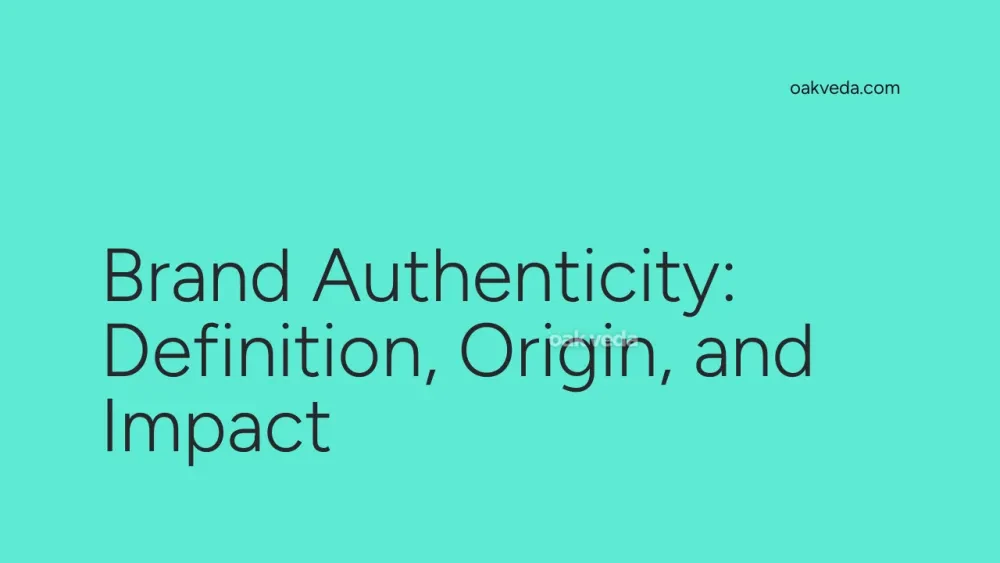
What is Brand Authenticity?
Brand authenticity refers to the degree to which a brand is perceived as genuine, sincere, and trustworthy by its customers and stakeholders. In the context of social media marketing, it's the practice of presenting a brand's true identity, values, and mission consistently across all platforms and interactions.
An authentic brand is characterized by:
- Transparency in business practices
- Honesty in communication about products or services
- Consistency in messaging and actions
- Alignment with core values and mission
- Responsiveness to customer needs and concerns
- Active engagement with the audience
Origin and Development of Brand Authenticity
The concept of brand authenticity has gained significant traction in recent years, particularly with the rise of social media and increased consumer awareness. While the idea of being genuine in business isn't new, the term "brand authenticity" began to emerge in marketing literature in the early 2000s.
As social media platforms evolved, consumers gained unprecedented access to information about brands, leading to higher expectations for transparency and authenticity. This shift forced companies to reevaluate their marketing strategies, moving away from polished, corporate messaging towards more genuine, human-centric approaches.
How Brand Authenticity Works
Brand authenticity works by creating a strong emotional connection between a brand and its audience. When a brand is perceived as authentic, it:
- Builds trust with consumers
- Fosters customer loyalty
- Differentiates the brand from competitors
- Increases brand advocacy
- Enhances overall brand reputation
To achieve authenticity, brands must align their actions with their stated values and consistently deliver on their promises. This involves transparent communication, ethical business practices, and genuine engagement with customers.
Popular Examples of Brand Authenticity
Several brands have successfully embraced authenticity in their social media strategies:
- Patagonia: Known for its environmental activism and transparency about its supply chain.
- Dove: Campaigns focusing on real beauty and body positivity.
- Airbnb: Emphasizing real experiences and connections between hosts and guests.
- Ben & Jerry's: Taking strong stances on social and political issues.
These brands have built strong, loyal customer bases by consistently demonstrating their values and engaging in honest dialogue with their audiences.
Impact of Brand Authenticity on Social Media Culture
Brand authenticity has significantly influenced social media culture by:
- Encouraging more transparent communication between brands and consumers
- Shifting focus from perfectly curated content to more realistic, behind-the-scenes glimpses
- Promoting user-generated content and customer testimonials
- Fostering communities around shared values and interests
- Inspiring brands to take stands on social and environmental issues
This shift has led to a more engaged and discerning social media audience, with users increasingly expecting brands to be genuine and socially responsible.
Controversies or Debates Surrounding Brand Authenticity
While brand authenticity is generally viewed positively, it's not without its challenges:
- Authenticity vs. Profitability: Some argue that maintaining authenticity can conflict with profit-driven decisions.
- Performative Authenticity: Brands may be accused of insincerity when their actions don't align with their stated values.
- Cultural Appropriation: Attempts at authenticity can sometimes lead to insensitive portrayals of cultures or communities.
- Privacy Concerns: Increased transparency may raise questions about data protection and employee privacy.
These debates highlight the importance of thoughtful, consistent implementation of authentic branding strategies.
How Brands and Influencers Use Brand Authenticity
Brands and influencers leverage authenticity in various ways:
- Storytelling: Sharing the brand's history, values, and behind-the-scenes content
- User-Generated Content: Encouraging and showcasing customer experiences
- Influencer Partnerships: Collaborating with influencers who genuinely align with the brand's values
- Social Responsibility: Engaging in and promoting charitable initiatives
- Transparency: Being open about processes, ingredients, or pricing
- Crisis Management: Addressing issues honestly and taking responsibility when mistakes occur
By consistently demonstrating authenticity, brands and influencers can build stronger, more meaningful relationships with their audiences.
Future Trends Related to Brand Authenticity
As brand authenticity continues to evolve, several trends are emerging:
- Increased Focus on Employee Advocacy: Brands showcasing their employees as authentic brand ambassadors
- AI and Authenticity: Balancing automation with genuine human interaction
- Hyper-Personalization: Tailoring authentic experiences to individual customer preferences
- Sustainability and Ethical Practices: Growing emphasis on environmental and social responsibility
- Real-Time Authenticity: Leveraging live video and instant messaging for more authentic interactions
These trends suggest that brand authenticity will continue to play a crucial role in shaping social media marketing strategies.
FAQs about Brand Authenticity
-
Why is brand authenticity important? Brand authenticity builds trust, fosters loyalty, and helps brands stand out in a crowded marketplace.
-
How can a brand demonstrate authenticity on social media? By being transparent, consistent in messaging, engaging genuinely with customers, and aligning actions with stated values.
-
Can brand authenticity impact sales? Yes, authentic brands often see increased customer loyalty and word-of-mouth marketing, which can positively impact sales.
-
Is it possible for a brand to be too authentic? While rare, excessive transparency or oversharing could potentially harm a brand's image or competitive advantage.
-
How do you measure brand authenticity? Through customer surveys, social media sentiment analysis, brand loyalty metrics, and monitoring customer feedback and engagement rates.
In conclusion, brand authenticity has become a cornerstone of effective social media marketing. As consumers increasingly seek genuine connections with the brands they support, authenticity will continue to be a key differentiator in the digital landscape. Brands that successfully embody and communicate their true values and identity will be well-positioned to build lasting relationships with their audiences and thrive in the evolving social media ecosystem.
You may be interested in:
- DM (Direct Message): Definition, Origin, and Impact
- Binge-Watching: Definition, Origin, and Impact on Social Media
- Chatbot: Definition, Origin, and Impact on Social Media
- Crispy R: Definition, Origin, and Impact on Social Media
- Quiet Quitting: Definition, Origin, and Impact
- Carousel Ads: Definition, Origin, and Impact on Social Media

